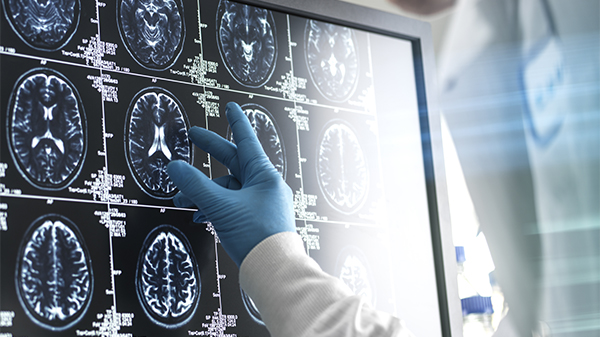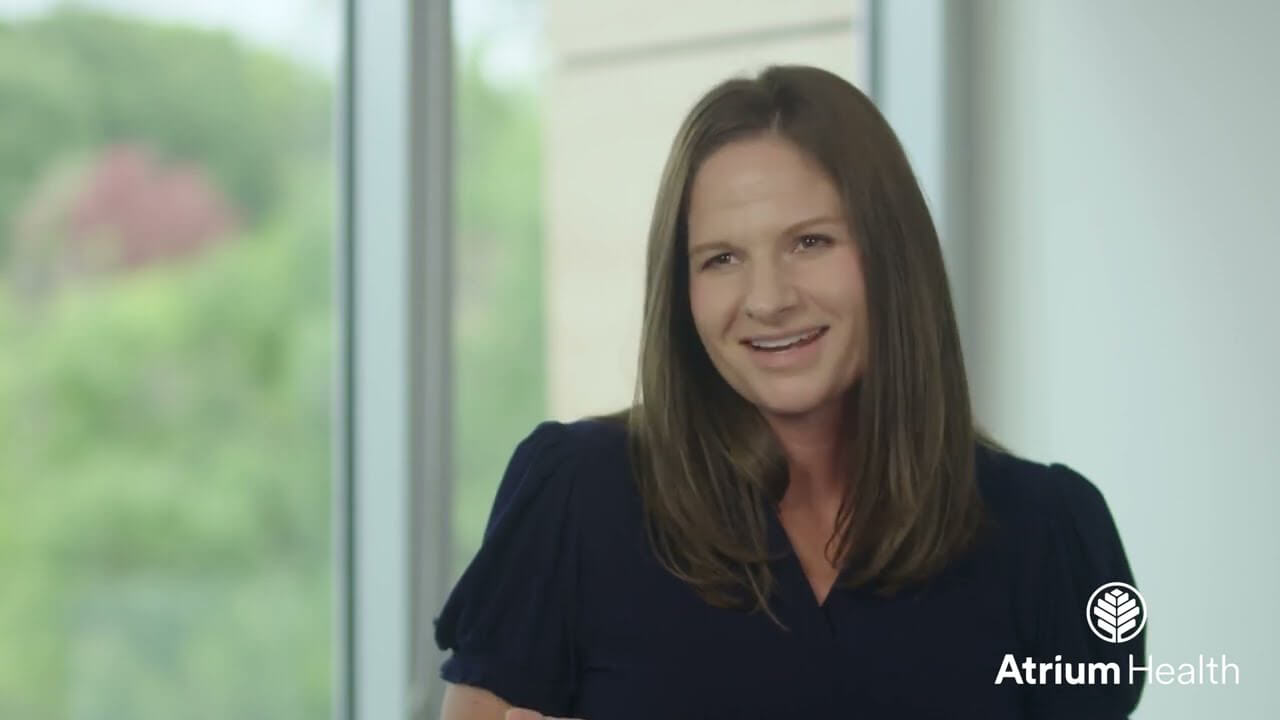Parkinson’s Disease
When you or a loved one is living with Parkinson’s disease or a related movement disorder, everyday activities can be challenging – but specialized treatment can make all the difference. At Atrium Health Neurosciences Institute, that’s exactly what you get.
Our nationally recognized Parkinson’s Disease and Movement Disorder program offers comprehensive, expert care at every step of your journey. Using the latest therapies and technologies, our leading movement disorder specialists deliver advanced treatment to help you enjoy a fuller, more independent life.
New patient appointments are by referral only. Ask your doctor if our program is right for you.Learn more about movement disorder care at Atrium Health Neurosciences Institute.
Why choose Atrium Health Neurosciences Institute?
- Personalized care plans: From early diagnosis to ongoing symptom management, we tailor care to your individual needs and goals. And we’re here to guide you as your condition changes, delivering the right care at the right time, long-term.
- Leading specialists: Our fellowship-trained neurologists have extensive experience and subspecialty expertise in Parkinson’s disease and related movement disorders. They work together with neurosurgeons, neuropsychologists, nurses, dietitians, social workers and physical, occupational and speech therapists to care for every aspect of your well-being.
- Advanced treatment: We offer the latest medical and surgical treatments, including deep brain stimulation, and a range of complementary and supportive therapies for Parkinson’s disease. Plus, we provide access to groundbreaking clinical trials that are shaping the future of care.
- Recognized expertise: In addition to earning the Ray of Hope Award from the Parkinson’s Association of the Carolinas, our center was the first in the nation to earn The Joint Commission Disease-Specific Care Certification for Parkinson’s disease.
Patient care – what we treat
Our specialists have expert experience treating Parkinson’s disease, which is one of the most common movement disorders.
We also provide care for related conditions known as atypical parkinsonism, including:
- Corticobasal degeneration (CBD)
- Dementia with Lewy bodies (DLB)
- Multiple system atrophy (MSA)
- Progressive supranuclear palsy (PSP)
Explore other movement disorders we treat.
Parkinson’s disease diagnosis and testing
For an accurate diagnosis, it’s essential to see an experienced specialist. Our board-certified neurologists are trained to identify and diagnose all kinds of movement disorders, including Parkinson’s disease and atypical parkinsonism.
We start by completing a comprehensive neurological exam and listening carefully as you describe your symptoms and medical history. To confirm your diagnosis or rule out other conditions, your doctor may also recommend:
- Dopamine transporter scan (DaTscan)
- Blood tests
- Genetic tests
- Magnetic resonance imaging (MRI)
Parkinson’s disease treatments
While there isn’t a cure for Parkinson’s disease yet, therapies offered at Atrium Health Neurosciences Institute can help ease your symptoms and enhance your quality of life. Our experts create a customized care plan just for you, providing long-term follow-up to make sure your treatment stays on track.
Our comprehensive treatment options include:
- Medications: Medications are frequently used to help control Parkinson’s symptoms. Our physicians work with you to find the medications and dosage that benefit you most, with the best symptom management and fewest side effects.
- Deep brain stimulation (DBS): For those who don’t respond well to medication alone, this surgical therapy can provide significant relief from Parkinson’s symptoms. We have more experience with DBS procedures than any other treatment program in the area. Meet our partner DBS surgeon.
- Focused ultrasound: As nationally recognized neurology and neurosurgery programs, we offer focused ultrasound for essential tremor and tremor-dominant Parkinson’s disease in collaboration with our team at Atrium Health Wake Forest Baptist. Using focused ultrasound waves, this incision-free brain surgery can provide same-day hand tremor relief. Learn more about focused ultrasound.
- Therapy and rehabilitation: In partnership with Atrium Health Carolinas Rehabilitation, we offer comprehensive physical, occupational and speech therapy services that are highly specialized for Parkinson’s disease. Your care is tailored to ease your symptoms and improve function.
- Botulinum toxin injections: Our neurologists can give injections directly to overactive muscles to reduce involuntary movements.
- Dietary support: Your care team includes a dietitian who will guide you in following a healthy, balanced diet that supports your overall well-being.
- Social work and support services: We have a dedicated social worker who can connect you with a wide range of resources, including support for caregivers and counseling for mental health issues like anxiety and depression.
Patient resources
Research
Our neurological expertise is powered by leading-edge research. We participate in innovative studies to better understand what causes Parkinson’s disease and look for potential cures. And we apply the latest findings in real time to provide the best possible care.

Find a clinical trial
Through our in-house neurosciences research, we give patients access to potentially breakthrough therapies.
Use our search tool to find current clinical trials. To learn more about our available studies, talk to your doctor.
Search clinical trialsFor referring providers
When you refer a patient to us, we keep you involved and up to date throughout their care. To make a referral, call our dedicated physician referral line at 704-468-0101 or send a fax to 704-468-0022.
Frequently asked questions
Symptoms can differ greatly from person to person. The most common signs and symptoms of Parkinson’s disease include:
- Tremor (shaking) when you’re at rest, usually starting in the hands, arms or legs
- Stiff or rigid muscles, often in the arms, legs or neck
- Slowed movements (bradykinesia)
- Problems with balance and walking
Parkinson’s can also cause symptoms that aren’t related to movement, like changes in sleep, mood, memory, blood pressure and bowel or bladder function.
Because Parkinson’s disease is a progressive condition, symptoms typically develop gradually and change or get worse over time. Our team is prepared to help you find the right diagnosis and treatment to achieve the best quality of life at every stage.
Currently, there’s no single test that can clearly identify Parkinson’s disease. The symptoms can also appear similar to other conditions or typical signs of aging. That’s why it’s essential to see a specialist who has the experience needed to make an accurate diagnosis, especially at early stages of the disease.
Because we see patients with all kinds of movement disorders, our neurologists can more easily differentiate Parkinson’s from other disorders.
To make a diagnosis, your doctor will ask questions about your symptoms and past health. They will also do a neurological exam to check how well your nerves are working. In some cases, they will order tests (like bloodwork or imaging) to rule out other conditions.
Experts typically evaluate Parkinson’s disease in 5 stages based on how far the disease has advanced.
- Stage 1: There may be some symptoms, like tremor, but they’re generally mild and may only affect one side of the body. Day-to-day life typically isn’t disrupted.
- Stage 2: Symptoms worsen and start to affect both sides of the body, which can impact balance and walking. Certain tasks may be more challenging, but overall, daily living isn’t significantly disrupted.
- Stage 3: Symptoms become more obvious, including difficulty with walking, standing and other movements. Everyday tasks are more difficult, but independent living is still possible.
- Stage 4: Symptoms are severe and disabling, with significant movement-related challenges. Assistance from a caregiver is needed to perform routine tasks.
- Stage 5: Symptoms are the most severe and may include a complete inability to stand, walk, eat or swallow. A caregiver is needed at all times.
Parkinson’s disease affects every person differently. In most cases, it takes many months or years for symptoms to progress from one stage to another.
Our team provides personalized care to maximize comfort and function at every stage, from the earliest signs of disease to the most advanced.
Atypical parkinsonism is a group of conditions that have similar symptoms to Parkinson’s disease, but don’t respond well to the same medications. People with atypical parkinsonism may also experience other symptoms that aren’t commonly seen with Parkinson’s disease.
Types of atypical parkinsonism include:
- Corticobasal degeneration (CBD)
- Dementia with Lewy bodies (DLB)
- Multiple system atrophy (MSA)
- Progressive supranuclear palsy (PSP)
For the best symptom management, it’s important to see a movement disorder specialist who can accurately diagnose your condition.
Deep brain stimulation (DBS) is a surgical treatment for a variety of conditions, including Parkinson’s disease and related movement disorders.
If medications are not effective in managing your symptoms, or if you experience serious side effects, DBS may be recommended. DBS is most often used to treat movement-related symptoms like tremor, stiffness and trouble walking.
During DBS, a neurosurgeon places electrodes on the brain that connect to a device implanted in the chest. The device sends signals back to the electrodes that modify the brain activity that causes tremors and other Parkinson’s symptoms.
DBS may be used in combination with medication and other therapies. It’s not an appropriate treatment for everyone with Parkinson’s disease. Our experts provide a comprehensive evaluation to determine if DBS will be a safe and effective treatment.
Focused ultrasound is an innovative, incision-free treatment for hand tremor caused by Parkinson’s disease or essential tremor.
Guided by magnetic resonance imaging (MRI), focused ultrasound waves precisely target the area of your brain that controls your tremor. In most cases, relief from tremor symptoms is noticeable immediately after the procedure.
We connect eligible patients to focused ultrasound treatment at Atrium Health Wake Forest Baptist in Winston-Salem, NC. If you’re interested in learning more, talk to your doctor. You can also find information about the treatment process, eligibility, side effects and more on this focused ultrasound treatment page.
As Parkinson’s disease progresses, the symptoms can make it difficult to go about your everyday life. Rehabilitation and therapy services are designed to help you manage these challenges.
In partnership with Atrium Health Carolinas Rehabilitation, we offer a variety of rehabilitative services for Parkinson’s disease, including:
- Physical therapy: A trained professional will guide you through exercises to reduce pain and improve mobility, strength and balance. All of our physical therapists who work with Parkinson’s disease patients have advanced certifications and provide highly specialized care.
- Occupational therapy: Working with an occupational therapist can help with everyday tasks like self-care and home chores.
- Speech therapy: Our speech-language pathologists can help you improve your ability swallow, speak and communicate effectively.
Learn more about neurodegenerative disorders rehabilitation.
Returning patients: Call 704-468-0101 or schedule through MyAtriumHealth.
New patients: Appointments for new patients are by referral only. If you’re interested in seeing one of our specialists, talk to your doctor. Referring physicians can fax a referral to 704-468-0022. To learn more about our program, call 704-468-0101.
Our Providers
Meet our providers and find the one for you. Use the filters to narrow your search.

